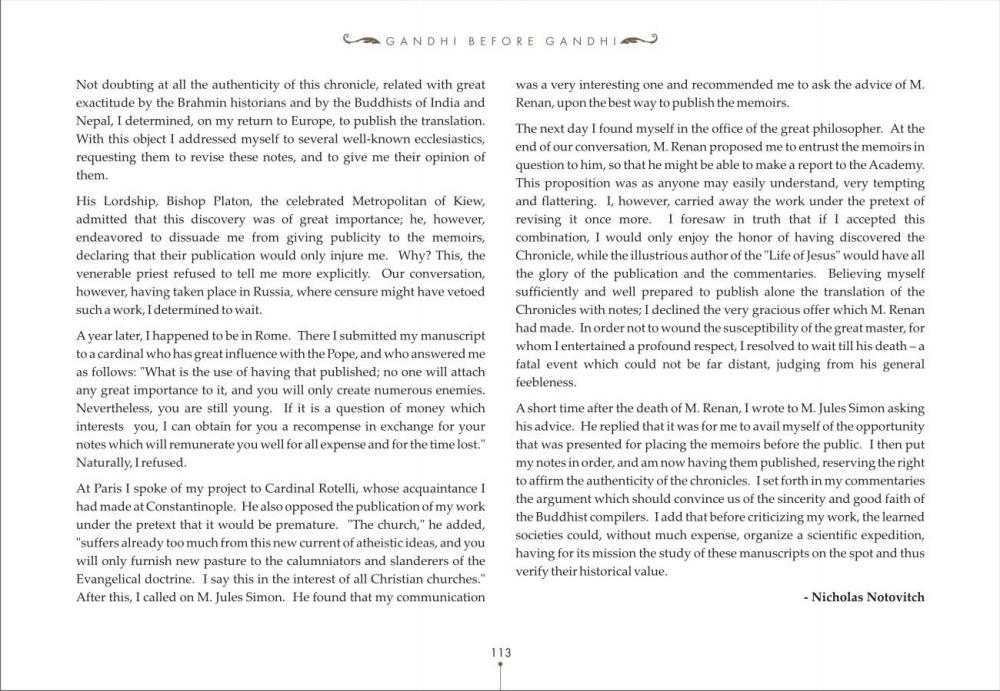________________
GANDHI BEFORE GANDHIA
Not doubting at all the authenticity of this chronicle, related with great exactitude by the Brahmin historians and by the Buddhists of India and Nepal, I determined, on my return to Europe, to publish the translation. With this object I addressed myself to several well-known ecclesiastics, requesting them to revise these notes, and to give me their opinion of them.
His Lordship, Bishop Platon, the celebrated Metropolitan of Kiew, admitted that this discovery was of great importance; he, however, endeavored to dissuade me from giving publicity to the memoirs, declaring that their publication would only injure me. Why? This, the venerable priest refused to tell me more explicitly. Our conversation, however, having taken place in Russia, where censure might have vetoed such a work, I determined to wait.
A year later, I happened to be in Rome. There I submitted my manuscript to a cardinal who has great influence with the Pope, and who answered me as follows: "What is the use of having that published; no one will attach any great importance to it, and you will only create numerous enemies. Nevertheless, you are still young. If it is a question of money which interests you, I can obtain for you a recompense in exchange for your notes which will remunerate you well for all expense and for the time lost." Naturally, I refused.
At Paris I spoke of my project to Cardinal Rotelli, whose acquaintance I had made at Constantinople. He also opposed the publication of my work under the pretext that it would be premature. "The church," he added, "suffers already too much from this new current of atheistic ideas, and you will only furnish new pasture to the calumniators and slanderers of the Evangelical doctrine. I say this in the interest of all Christian churches." After this, I called on M. Jules Simon. He found that my communication
113
was a very interesting one and recommended me to ask the advice of M. Renan, upon the best way to publish the memoirs.
The next day I found myself in the office of the great philosopher. At the end of our conversation, M. Renan proposed me to entrust the memoirs in question to him, so that he might be able to make a report to the Academy. This proposition was as anyone may easily understand, very tempting and flattering. 1, however, carried away the work under the pretext of revising it once more. I foresaw in truth that if I accepted this combination, I would only enjoy the honor of having discovered the Chronicle, while the illustrious author of the "Life of Jesus" would have all the glory of the publication and the commentaries. Believing myself sufficiently and well prepared to publish alone the translation of the Chronicles with notes; I declined the very gracious offer which M. Renan had made. In order not to wound the susceptibility of the great master, for whom I entertained a profound respect, I resolved to wait till his death-a fatal event which could not be far distant, judging from his general feebleness.
A short time after the death of M. Renan, I wrote to M. Jules Simon asking his advice. He replied that it was for me to avail myself of the opportunity that was presented for placing the memoirs before the public. I then put my notes in order, and am now having them published, reserving the right to affirm the authenticity of the chronicles. I set forth in my commentaries the argument which should convince us of the sincerity and good faith of the Buddhist compilers. I add that before criticizing my work, the learned societies could, without much expense, organize a scientific expedition, having for its mission the study of these manuscripts on the spot and thus verify their historical value.
- Nicholas Notovitch




